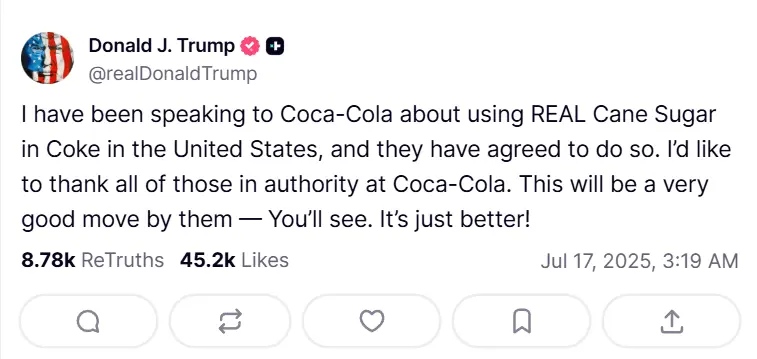President Donald Trump announced that Coca-Cola has agreed to replace high-fructose corn syrup with real cane sugar in its U.S. products. This change, which mirrors the formulation used in Coca-Cola’s Mexican version, is expected to enhance the taste and quality of the iconic soft drink.
Coca-Cola Shift from High-Fructose Corn Syrup to Cane Sugar
Since the 1980s, Coca-Cola’s U.S. products have utilized high-fructose corn syrup (HFCS) as a sweetener due to its cost-effectiveness, bolstered by federal subsidies for corn production. However, HFCS has faced criticism for its potential health risks, including links to obesity and diabetes. In contrast, real cane sugar has been associated with a more natural taste and fewer health concerns.

President Trump, known for his preference for Diet Coke, has long advocated for the use of cane sugar in American-made sodas. In a post on Truth Social, he expressed gratitude to Coca-Cola executives for their willingness to make this change, stating, “This will be a very good move by them — You’ll see. It’s just better!”
The announcement has garnered mixed reactions from various stakeholders. Health advocates have praised the decision, viewing it as a step toward reducing the consumption of artificial additives and promoting healthier food standards. Additionally, Health and Human Services Secretary Robert F. Kennedy Jr. has supported initiatives to eliminate artificial dyes and reduce the use of HFCS in food products.
Conversely, some industry groups, such as the Corn Refiners Association, have expressed concerns that the shift could negatively impact U.S. corn farmers and manufacturers. They argue that relying more on imported cane sugar may not align with the “America First” ideology and could have economic repercussions.
The potential recipe change comes amid renewed scrutiny of added sugars in American diets, championed by figures like Robert F. Kennedy Jr. through the Make America Healthy Again (MAHA) initiative. Whether replacing HFCS with cane sugar meaningfully improves health outcomes remains uncertain.
Coca-Cola’s Response
While Coca-Cola has not officially confirmed the change, the company has acknowledged President Trump’s announcement. In a statement, Coca-Cola expressed appreciation for the president’s support and hinted at upcoming product developments that align with consumer preferences for more natural ingredients.
Coca‑Cola has pledged that “new product offerings” are on the horizon, but has not confirmed when or how a cane sugar variant may hit shelves. Industry watchers speculate it could begin as a limited edition before a possible nationwide rollout, depending on consumer response and logistical considerations, such as supply chain and shelf life.
Coca-Cola’s decision to switch to real cane sugar in its U.S. products marks a notable shift in the beverage industry’s approach to sweeteners. This change reflects growing consumer demand for more natural ingredients and aligns with broader health initiatives. As the company moves forward with this transition, it will be interesting to observe the impact on consumer preferences and the broader market.


